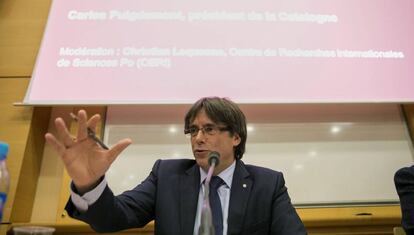New Spanish ministers disappoint the Catalan government
Regional premier Carles Puigdemont insists that an independence referendum should be called


There have been changes to the plans of the premier of Catalonia, Carles Puigdemont, for the calling of an independence referendum in 2017. This is the goal pursued by the Catalan Government after the designation of the new ministers by the re-elected prime minister, Mariano Rajoy. The names chosen to lead the Spanish government have not only caused displeasure in the Catalan cabinet, but also are seen as a way to continue refusing the celebration of the referendum.
Puigdemont called Rajoy last Wednesday to congratulate him for having secured the necessary simple majority in parliament to become president again. Both talked informally about the meeting they want to arrange shortly, at which Puigdemont would like to insist on an agreed formula to hold a binding independence vote in Catalonia.
But Puigdemont has already refused the participation of his government in the negotiations of the new financing system that has to be designed for all Spanish regions during this term. Puigdemont’s priority is to talk about the referendum, and also to put back on the table 46 measures he handed over in May to Rajoy, aimed at resolving the unfulfilled issues of the Spanish government regarding Catalonia. If Rajoy were to accept this list of demands, it would be seen by Puigdemont as an important improvement in the relationship between both parties.
“It’s disappointing,” said sources from the Catalan Government about the new Spanish ministers. The non-reformist Cabinet chosen by Mariano Rajoy is especially negatively considered in Catalonia, where it is viewed as if there had been no elections but a provisional government for 11 months. The departure of the former interior minister, Jorge Fernández Díaz, is seen as a logical consequence after he was involved in a political scandal involving the release of recorded conversations in which he was planning to use public resources to incriminate pro-independence politicians.
The Catalan government was also surprised by the designation of Spanish deputy prime minister, Soraya Sáenz de Santamaría, as the woman in charge of the talks between the Spanish and Catalan governments, as well as with the rest of Spanish autonomous regions. On one hand, Puigdemont appreciates the negotiating approach that Saénz de Santamaría may have, one of the Catalan government’s biggest requirements. However, it has not forgotten the attitude of the deputy PM at press conferences, where she has been reluctant – “a wall” – to answer anything related to the independence of Catalonia.
As Catalonia still needs Spanish funds for its financing, the continuation of Cristóbal Montoro as the finance minister has also been seen with disappointment, as well as the continuity of the justice minister, Rafael Català. The judicial response to the Catalan bid for independence is one of the topics that most concerns the Catalan government, as they consider it a “political situation” rather than a legal one. The naming of Alfonso Dastis as the new minister for foreign affairs is also seen with skepticism. Close to Rajoy and loyal to the diplomatic discretion, Dastis will have to eradicate the initiatives of the Catalan government to internationalize their demands for an independence referendum.
English version by Ferran Moreno and Santiago José Sánchez.
elpais.cat in English
From November onward, the Catalan edition of EL PAÍS, Elpais.cat, will include a selection of news stories in English.
The texts will be prepared by journalism students at the Pomepeu Fabra University (UPF), who will be adapting content from Catalan current affairs every week, adding extra information and explanation to these stories so that they can be understood in a global context.
Tu suscripción se está usando en otro dispositivo
¿Quieres añadir otro usuario a tu suscripción?
Si continúas leyendo en este dispositivo, no se podrá leer en el otro.
FlechaTu suscripción se está usando en otro dispositivo y solo puedes acceder a EL PAÍS desde un dispositivo a la vez.
Si quieres compartir tu cuenta, cambia tu suscripción a la modalidad Premium, así podrás añadir otro usuario. Cada uno accederá con su propia cuenta de email, lo que os permitirá personalizar vuestra experiencia en EL PAÍS.
¿Tienes una suscripción de empresa? Accede aquí para contratar más cuentas.
En el caso de no saber quién está usando tu cuenta, te recomendamos cambiar tu contraseña aquí.
Si decides continuar compartiendo tu cuenta, este mensaje se mostrará en tu dispositivo y en el de la otra persona que está usando tu cuenta de forma indefinida, afectando a tu experiencia de lectura. Puedes consultar aquí los términos y condiciones de la suscripción digital.








































